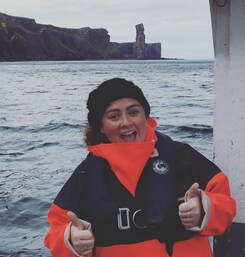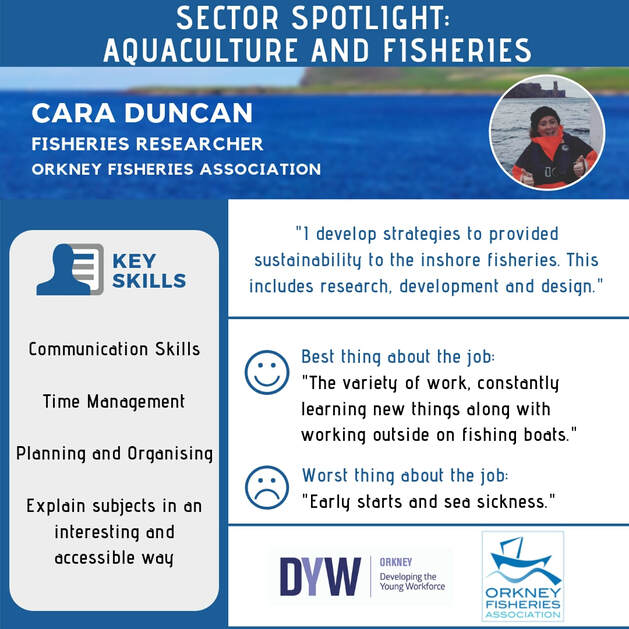 Cara is a Fisheries Researcher at Orkney Fisheries Association. Cara is a Fisheries Researcher at Orkney Fisheries Association. As part of our Sector Spotlight on Aquaculture and Fisheries, we have spoken to Cara Duncan, a Fisheries Researcher at Orkney Fisheries Association. Cara studied Zoology and for her Master’s Degree she specialised in shellfish research, which brought her to Orkney for her dissertation. Since then Cara has worked in research for local companies in Orkney.  What do you do as a Fisheries Researcher? “I develop green fisheries strategies to provide sustainability to the inshore fisheries. This includes researching the development of a seasonal fishing timetable, establishing a carbon footprint for the industry and designing a bespoke multi-species escape panel for creels.” Can you describe a typical day as a Fisheries Researcher? “A typical day in this role can vary. One day I could be out at sea on a creel boat collecting fishing data and talking to the fishermen, gathering their views and opinions to support the industry. Another day I could be based in the office conducting data entry, analysis and report writing.” How did you end up in your current role as a Fisheries Researcher? “I studied Zoology at the University at Aberdeen and graduated not knowing what field of specialism I wanted to go into. From there I decided that progressing to undertake a master’s degree would further my education and give me more in-depth knowledge. “It was here that I specialised in shellfish research and lead me to Orkney to study green crabs for my dissertation at Heriot-Watt ICIT campus. “After my masters completion I worked for Orkney Sustainable Fisheries as a Research Assistant. Once this contract finished I then became a Fisheries Researcher with Orkney Fisheries Association. “Now that this research project has come to an end, I am now a Fisheries Observer with Scottish Fishermen’s Federation where I collect stock assessment data on whitefish and prawn boats. “My personal career journey is not a straightforward path, as many positions are short term contract work reliant on funding. However, this has allowed me to gain a variety of knowledge, skills and experiences to become a well-rounded scientist. Overall, in building a career it takes patience and time within this industry.” What is the best thing about being a Fisheries Researcher? “The variety of work, constantly learning new things along with working outside on fishing boats, especially on nice days. “Another great thing about the job is chatting to fishermen and learning about the industry and the history of it from them. One of the best things about the job is directly applying science to help benefit the local industry and local people.” What is the worst thing about being a Fisheries Researcher? “Early starts and sea sickness.” What skills do you need to be a Fisheries Researcher?
What qualifications do you have?
Would you recommend a career in the Aquaculture and Fisheries Industry? “Absolutely! It can be challenging with long hours and time spent away from home. But it is a very diverse industry with lots to learn with many avenues in science, management and policy in which to build a career from. Visit Orkney Fisheries Association on their: Website - https://www.orkneyfisheries.com/ Facebook - https://www.facebook.com/Orkneyfisheries/ Twitter - https://twitter.com/orkneyfisheries Comments are closed.
|
Archives
June 2024
Categories
All
|
 RSS Feed
RSS Feed